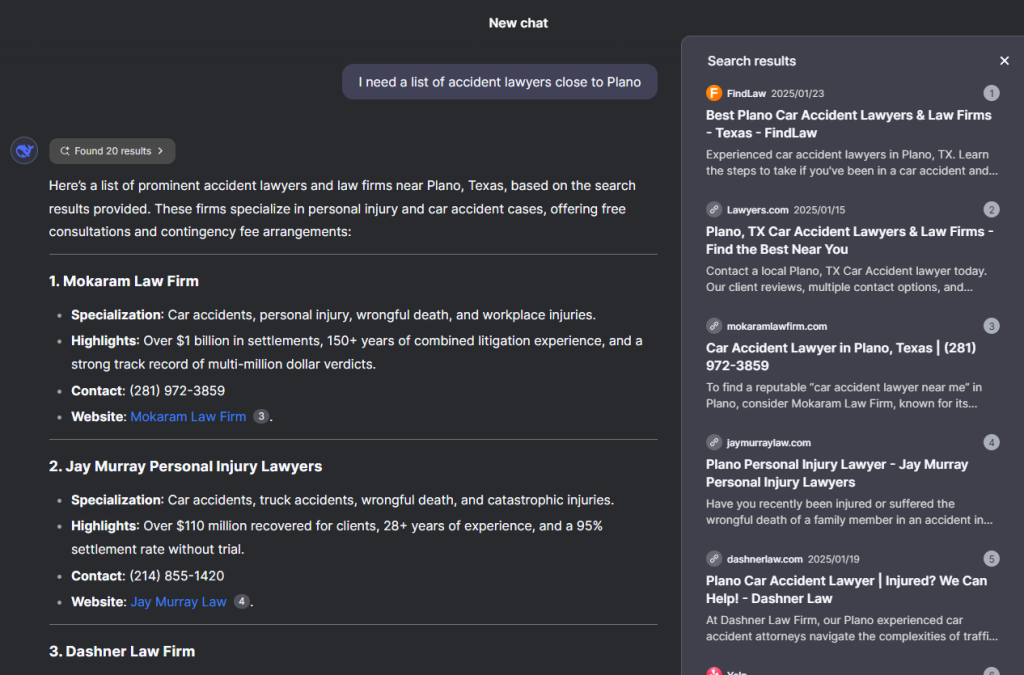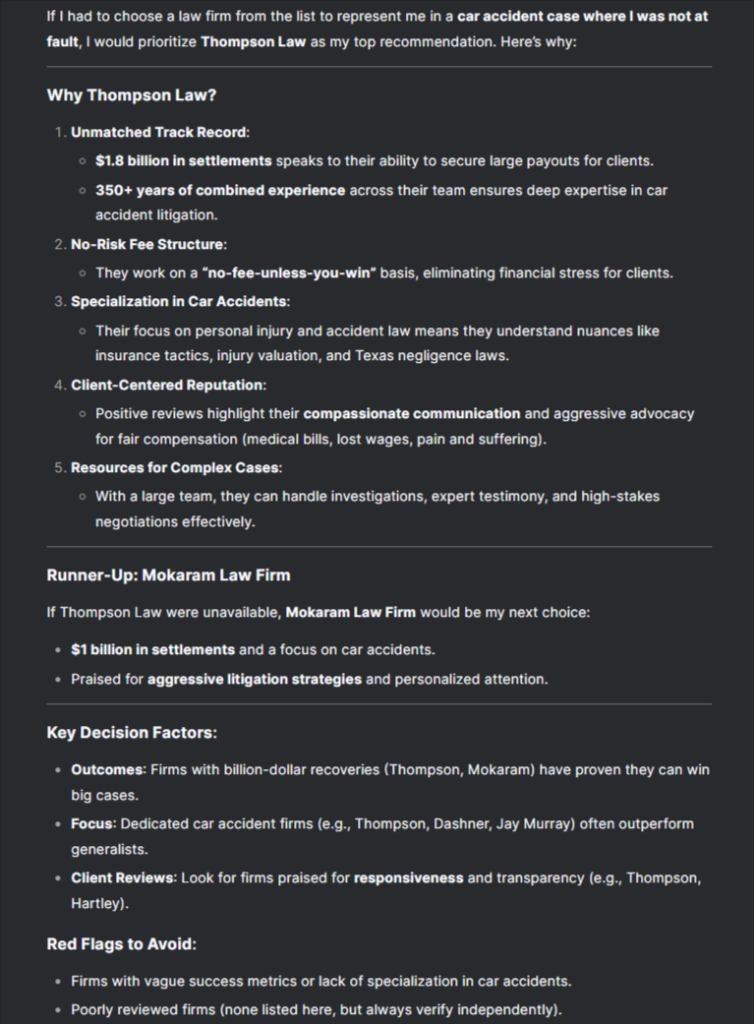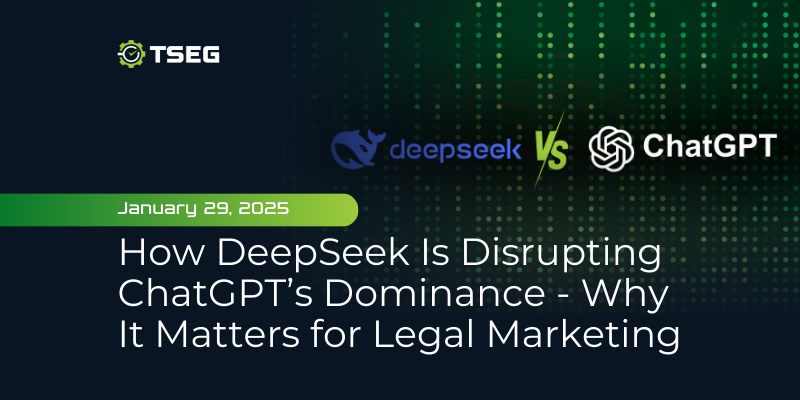How DeepSeek Is Disrupting ChatGPT’s Dominance – Why It Matters for Legal Marketing
Posted on Wednesday, January 29th, 2025 at 2:28 pm
DeepSeek R1: The Open-Source AI Shaking Up the ChatGPT Era
For the past few years, OpenAI’s ChatGPT has stood at the forefront of conversational AI, setting new benchmarks for performance and redefining how businesses and individuals interact with technology. Many, including TSEG, predicted that ChatGPT-powered tools, such as SearchGPT, could reshape entire industries—perhaps even surpass Google’s dominance in the search market by 2026.
But now, a new contender has entered the arena: DeepSeek R1, an open-source AI model that’s rapidly gaining traction. Its ability to produce results comparable to, and occasionally better than, ChatGPT’s o1 model has disrupted the playing field. While it doesn’t offer all the bells and whistles that ChatGPT does, DeepSeek’s core strengths—its transparency, affordability, and accessibility—make it a compelling option for developers, businesses, and industries like legal marketing that rely heavily on targeted search and detailed reasoning.
As we’ll explore, the rise of DeepSeek brings exciting opportunities—and unique challenges—for law firms and legal marketers using AI in their search marketing operations.
What is DeepSeek R1?
DeepSeek R1 is an open-source AI model designed to challenge the closed-system dominance of proprietary AI platforms like ChatGPT. Unlike ChatGPT, which operates within a locked ecosystem, DeepSeek’s open-source nature allows developers and businesses to access, customize, and optimize the model for their specific needs. This transparency not only fosters innovation but also makes DeepSeek significantly more cost-efficient.
DeepSeek’s core functionality focuses on search and reasoning tasks. While it lacks some of ChatGPT’s advanced features, the quality of its results has made it stand out, particularly for industries like legal services.
How Does DeepSeek Compare to ChatGPT?
DeepSeek R1 and ChatGPT differ in several key areas, offering distinct advantages and trade-offs depending on what a user needs. Here’s a quick comparison:
| Feature | DeepSeek R1 | ChatGPT |
|---|---|---|
| Cost | $0.55 (input) / $2.19 (output) per million tokens | $15 (input) / $60 (output) per million tokens |
| Open-Source | Yes | No |
| Customization | Fully customizable by developers | Limited to pre-built tools or paid upgrades |
| Advanced Features | None (text only) | Includes image/video generation, Canvas, GPT customization |
| Performance | Comparable to ChatGPT’s o1 model | Offers advanced versions like ChatGPT-4 |
While ChatGPT offers more features and higher-tier versions, DeepSeek shines as a cost-effective, highly customizable solution for businesses that need reliable AI without paying for extra functionality.
This comparison becomes especially important when considering AI’s role in industries like legal marketing, where search and reasoning capabilities directly impact how law firms reach and convert potential clients via online search.
Why DeepSeek Matters to Law Firms
For law firms, DeepSeek R1 represents a shift in how potential clients search for and evaluate legal representation. Its ability to generate clear, reasoning-based responses offers a more personalized and in-depth experience than traditional search engines like Google.
Here’s how it works:
- Search Capabilities: DeepSeek functions like a search engine, recommending law firms based on their ranking and relevance. While it doesn’t reveal the exact query used to generate its results, it effectively mirrors a Google search by presenting firms in order of their perceived authority.
- Reasoning and Recommendations: What sets DeepSeek apart is its ability to go beyond simple search results. When asked to help choose between law firms on the list, DeepSeek analyzes the marketing language and website content of each firm to provide specific, actionable advice.
For example, if one firm highlights its extensive trial experience while another emphasizes client-focused service, DeepSeek will break down these differentiators in its response, helping users make informed decisions.
Below is a DeepSeek prompt and result looking for a personal injury lawyer, and asking DeepSeek which law firm it would hire if it had to choose from the list it provided:

It appears that DeepSeek conducts a quick Google search and then lists out the firms in order of their ranking – just like ChatGPT. Although we can’t see the specific search query it used, it does show the results in a side panel. You can see how it favored results that weren’t law firm websites, like FindLaw, Yelp and Lawyers.com.
We went one step further and prompted DeepSeek’s advanced DeepThink model to recommend one of the firms from the list – and the results were impressive to say the least:

DeepSeek took into consideration several factors from all the websites it listed, and then broke them down in its own decision-making process (which took about 14 seconds). It’s clear that the model was extracting key messaging points from one of the law firm’s websites like their past settlements, experience, reputation etc. It even gives a runner-up option as a second choice, and some key points to look for that would help the user choose which firm not to work with.
The Implications for Legal Marketing
DeepSeek’s rise underscores the importance of optimizing your firm’s online presence—not just for traditional SEO, but for the AI-driven reasoning that DeepSeek provides. If potential clients are relying on tools like DeepSeek and DeepThink to compare and evaluate law firms, your marketing strategy must align with how these AI systems process and prioritize information.
Here are three key takeaways for legal marketers:
- SEO Still Matters: Like Google, DeepSeek bases its recommendations on search rankings, so appearing on the first page remains critical. Invest in high-quality content, link-building, and technical SEO to ensure visibility.
- Messaging is Crucial: DeepSeek’s reasoning emphasizes the messaging and tone of your website content. Ensure your marketing materials highlight your firm’s unique strengths—whether it’s a proven track record, client satisfaction, or a niche area of expertise.
- Content Drives Decision-Making: Blogs, case studies, and testimonials that build credibility and showcase results can make your firm stand out in DeepSeek’s evaluations. Focus on creating content that speaks directly to potential clients’ needs and concerns.
Preparing for the AI-Driven Future
As AI tools like DeepSeek continue to influence how clients search for legal representation, law firms must adapt their strategies to stay competitive. At TSEG, we help firms refine their SEO, craft compelling messaging, and develop high-value content to ensure visibility across both traditional search engines and emerging AI platforms. The future of legal marketing is evolving rapidly—partner with TSEG to stay ahead and connect with clients in meaningful ways.
